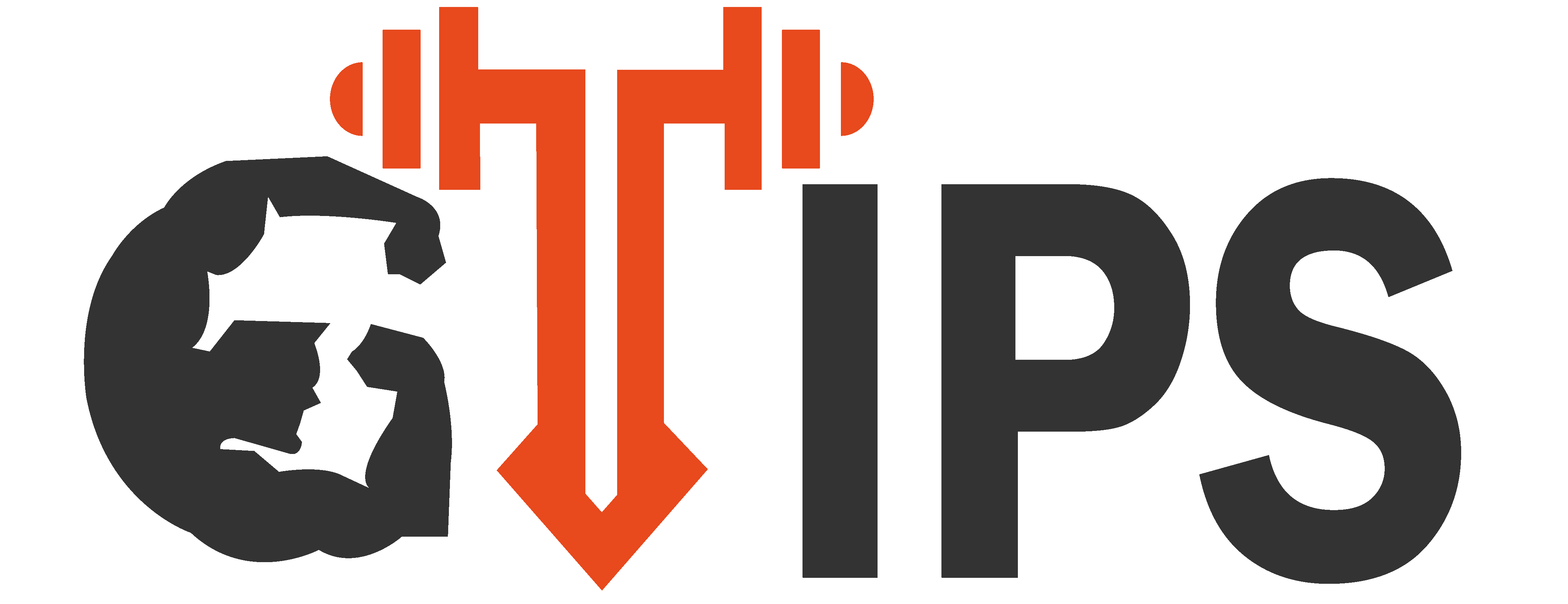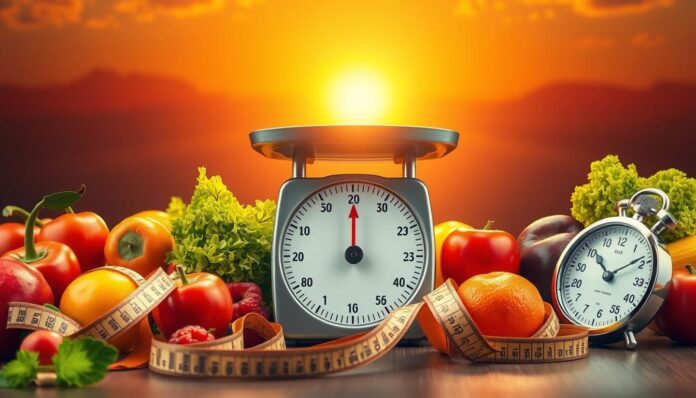Are you looking to lose weight fast? Rapid weight loss diets might be what you need. These diets aim to help you lose pounds quickly. But, it’s important to know the risks and benefits before starting.
In this guide, we’ll explore diet plans to lose weight quickly. We’ll look at different methods, how well they work, and what to consider. If you want to start losing weight fast or need a quicker way to your goal, this article will help you make smart choices.
Key Takeaways
- Rapid weight loss diets can help you shed pounds quickly, but they should be approached with caution and medical supervision.
- Very low-calorie diets (VLCDs) and low-calorie diets (LCDs) can lead to rapid initial weight loss, but they carry significant risks and are difficult to sustain long-term.
- Safer strategies for quick weight loss include intermittent fasting, time-restricted eating, and balancing a calorie-reduced diet with regular exercise.
- Sustainable weight loss is often achieved through a balanced, nutrient-dense diet and a consistent exercise routine.
- Consult with a healthcare professional before embarking on any rapid weight loss program to ensure it is safe and appropriate for your individual needs.
Understanding Rapid Weight Loss Diets
Rapid weight loss diets, also known as very low-calorie diets (VLCDs) or low-calorie diets (LCDs), are designed for quick weight loss. They limit calories to 800 or less daily. This leads to losing more than 2 pounds a week.
What are Rapid Weight Loss Diets?
These diets are for people with obesity who want to lose a lot of weight fast. Healthcare providers usually don’t recommend them because of the risks.
How Do Rapid Weight Loss Diets Work?
They work by drastically cutting calories, causing the body to quickly burn fat. But, this can also lead to losing muscle, bone, and water, not just fat.
While losing weight fast might seem good, it’s important to know the downsides. Healthier, sustainable weight loss and lifestyle changes are better for keeping weight off long-term.
| Diet Type | Calorie Intake | Weekly Weight Loss |
|---|---|---|
| Rapid Weight Loss Diet | 800 calories or less | More than 2 pounds |
| Moderate Calorie Reduction | 1,200-1,500 calories | 0.5-2 pounds |
“Rapid weight loss diets can be effective for short-term weight loss, but they may not be sustainable in the long run and can come with risks. Gradual, lifestyle-based changes are often a healthier approach for lasting results.”
Very Low-Calorie Diets (VLCDs)
Very low-calorie diets (VLCDs) are a strict way to lose weight fast. They are best for people with obesity who need to lose weight quickly before surgery. These diets limit calories to as little as 800 per day, leading to a weight loss of 3-5 pounds each week.
Defining VLCDs
VLCDs started in the 1970s for those with a BMI of 30 or higher. Unlike regular low-calorie diets, VLCDs use meal replacements like formulas, shakes, and bars. This ensures you get enough nutrients while cutting calories drastically. It leads to quick, significant weight loss but should only be done with a doctor’s close watch.
Risks and Precautions for VLCDs
- Side effects can include headaches, fatigue, nausea, constipation, and dizziness, mostly in the first few weeks.
- There is an increased risk of developing gallstones during rapid weight loss, which may require medication to prevent.
- Bone density loss due to low calcium levels is a concern, as is the risk of regaining weight if the diet is not transitioned to a sustainable plan.
- VLCDs are not recommended for individuals with a BMI between 27-30 without weight-related medical conditions, or for pregnant/breastfeeding women, children, teens, and those over 50 due to possible complications.
While VLCDs can show quick results, they should only be used under a doctor’s watch due to the risks. Lasting weight loss comes from healthy eating and regular exercise, even after a VLCD program.
Low-Calorie Diets (LCDs)
If you want to lose weight fast, low-calorie diets (LCDs) might help. Women can eat 1,200 to 1,500 calories a day, while men can have 1,500 to 1,800. These diets mix meal replacements with regular food, making them easier to stick to than very low-calorie diets (VLCDs).
Low-calorie diets lead to slower weight loss than VLCDs. But they are safer and more sustainable for many. The goal is to lose 10 percent of your body weight, with 1 to 2 pounds a week for the first 6 months.
To lose weight, aim for a 500 to 1,000 calorie deficit each day. This means losing 1 to 2 pounds weekly. Also, do 30 to 45 minutes of moderate exercise, 3 to 5 times a week, in the first phase. Combining a low calorie diet with physical activity is key for lasting weight loss.
After 6 months, focus on keeping the weight off. This means eating healthy and staying active. It’s all about maintaining a low calorie diet and regular physical activity.
| Weight Loss Metrics | LCD Recommendations |
|---|---|
| Initial Weight-loss Goal | Reduce body weight by about 10 percent from baseline |
| Recommended Weight Loss | About 1 to 2 pounds per week for 6 months |
| Dietary Deficit | Aim for 500 to 1,000 kcal/day for weight loss of 1 to 2 pounds per week |
| Physical Activity Recommendation | 30 to 45 minutes of moderate activity, 3 to 5 days a week initially |
| Long-term Physical Activity Goal | Accumulate at least 30 minutes or more of moderate-intensity physical activity on most days |
Low-calorie diets are safer and more sustainable weight loss than VLCDs. Always work with a healthcare provider to make sure the diet fits your needs and goals.
Intermittent Fasting and Time-Restricted Eating
Intermittent fasting and time-restricted eating are gaining popularity for quick weight loss. These methods involve alternating between fasting and eating. They aim to create a calorie deficit and boost fat burning.
The 16:8 Method
The 16:8 method limits eating to an 8-hour window after fasting for 16 hours. It can cut daily calories by 20%, leading to 5% weight loss in 2-4 weeks. It also improves cholesterol and blood sugar levels.
The 5:2 System
The 5:2 plan involves eating normally for five days and then fasting for two days. This can lead to weight loss and better insulin sensitivity. But, more research is needed on its long-term effects.
| Fasting Method | Fasting Window | Potential Benefits |
|---|---|---|
| 12-Hour Fast | 12 hours | Fat burning, weight loss |
| 16:8 Method | 16 hours | Weight management, cholesterol improvement, blood sugar control |
| 5:2 Diet | 2 days of 500-600 calories | Weight loss, improved insulin sensitivity |
| Alternate Day Fasting | 24 hours | Weight loss, heart health |
| Weekly 24-Hour Fast | 24 hours, 1-2 times per week | Calorie reduction, weight loss |
| Warrior Diet | 20-hour fast, 4-hour eating | Weight management |
Intermittent fasting and time-restricted eating can help with quick weight loss. But, talk to a healthcare provider first. They might not be right for everyone, like those with certain health issues or eating disorders.
For lasting weight loss, find a method that fits your life. Combining these fasting methods with a healthy diet and exercise can help reach your goals.
diet plans to lose weight quickly
Fad diets promise quick weight loss but often have big drawbacks. They usually cut calories severely, leading to fast weight loss that’s hard to keep up. Doctors might say wait to start exercising until you’re on a diet that lasts longer.
Very low-calorie diets (VLCD) can have as few as 800 calories a day. This can lead to losing 3 to 5 pounds a week. But, VLCD is only for adults with obesity and is not for more than 12 weeks. Low-calorie diets (LCD) allow 1,200 to 1,800 calories a day, leading to slower but effective weight loss.
Balancing Exercise and Diet
Quick weight loss is tempting, but it’s key to balance it with a healthy lifestyle. Nutrition and exercise are essential for lasting weight loss. Eating smaller portions, drinking more water, and watching calories can help. Regular exercise also keeps muscle and boosts metabolism, aiding in sustainable weight loss.
| Strategy | Description | Potential for Rapid Weight Loss |
|---|---|---|
| 16:8 Method | Limits eating to an 8-hour window daily | Potential for rapid weight loss |
| 5:2 System | Involves 2 fasting days per week | Can trigger rapid weight loss |
Fad diets and quick weight loss plans can be risky. They might lead to gallstones, fatigue, and stomach problems. Losing more than 1 or 2 pounds a week is not safe and can cause muscle loss and health issues. These diets are not good for kids, teens, pregnant women, or older adults without a doctor’s watch.
While quick weight loss diets can help with health issues like diabetes and high blood pressure, they can also lead to quick weight gain. The best goal is to lose 1-2 pounds a week through healthy eating and exercise.
Potential Health Benefits of Rapid Weight Loss
Rapid weight loss diets are often suggested for those with obesity. Losing weight quickly can help with diabetes, high cholesterol, and high blood pressure. For these people, the benefits might be worth the risks, as long as a healthcare provider is watching closely.
Improvements in Chronic Conditions
Studies show that quick weight loss on a balanced diet can greatly improve health. A ketogenic (“keto”) diet is very effective for short-term weight loss and can even reduce seizures. Intermittent fasting also lowers blood pressure, blood sugar, and cholesterol.
The Mediterranean diet is well-studied and helps with many health issues, like obesity and heart disease. Experts say the best diet is one you can keep up with, fitting your health and lifestyle.
While quick weight loss isn’t sustainable long-term, it can be a good start for health improvement. The important thing is to work with doctors to get a diet plan that’s balanced and helps manage weight over time.
| Condition | Potential Improvement with Rapid Weight Loss |
|---|---|
| Obesity | Significant reduction in weight and body mass index (BMI) |
| Diabetes | Improved blood sugar control and possible lower medication needs |
| High Cholesterol | Lower total cholesterol, LDL (“bad”) cholesterol, and triglycerides |
| High Blood Pressure | Lower systolic and diastolic blood pressure readings |
“The most successful diet is the one that can be maintained sustainably, tailored to individual health needs and lifestyle factors.”
Risks and Side Effects of Rapid Weight Loss
Rapid weight loss diets promise quick results but come with risks. It’s key to know these risks before starting any drastic weight loss plan.
Common Side Effects
Methods like very low-calorie diets can cause unwanted side effects. These include:
- Gallstones – Up to 25% of people losing a lot of weight may get gallstones.
- Gout – Losing weight quickly can raise uric acid levels, causing gout.
- Fatigue – Eating very few calories can make you feel very tired.
- Nutrient deficiency – Losing weight fast can lead to a lack of important vitamins and minerals.
Long-Term Considerations
Rapid weight loss also has long-term health risks:
- Weight regain – Losing weight fast often means gaining it back quickly, leading to more health issues.
- Muscle and bone loss – Losing weight too fast can result in losing muscle, water, and bone density, affecting your health long-term.
- Compromised long-term health – Quick weight loss diets should only be done under a doctor’s watch and for a short time, not as a permanent lifestyle change.
It’s better to lose weight slowly and healthily. This way, you can keep the weight off for good. Always talk to a healthcare professional before starting any weight loss plan to make sure it’s safe and right for you.
Conclusion
Rapid weight loss diets might seem appealing for quick results, but they come with risks. They can be hard to keep up and may not lead to lasting weight loss. A better way is to make slow, lasting changes in your lifestyle.
This means eating fewer calories and exercising regularly. It’s important to talk to a healthcare provider before starting any weight loss plan. They can help make sure you’re losing weight safely and effectively.
The goal is to find a plan that you can stick with for a long time. This way, you can reach your weight loss goals and improve your health.
Rapid weight loss diets might promise quick results, but they’re often not safe or sustainable. They can be hard to stick to, leading to weight gain and health problems. Instead, focus on making lasting lifestyle changes.
Choose a balanced diet with fewer calories and regular exercise. Working with your healthcare provider can help you find a safe and effective weight loss plan. This way, you can keep the weight off and improve your health in the long run.
The best way to lose weight is to take a holistic, evidence-based approach. While quick weight loss diets might work at first, a slow, lifestyle-focused plan is usually better. By making smart choices and focusing on your long-term health, you can achieve lasting weight management and enjoy better physical and mental health.
FAQ
What are rapid weight loss diets?
Rapid weight loss diets help you lose more than 2 pounds a week. They involve eating very few calories. These diets are often chosen by people with obesity who want to lose weight fast.
How do rapid weight loss diets work?
These diets make your body use a lot of fat quickly. But, they can also cause you to lose muscle, bone, and water, not just fat.
What are very low-calorie diets (VLCDs)?
VLCDs let you eat as little as 800 calories a day. This can lead to losing 3-5 pounds a week. They use meal replacements to ensure you get enough nutrients. But, they should only be done under a doctor’s watch because of the risks.
What are low-calorie diets (LCDs)?
LCDs let you eat 1,200 to 1,500 calories a day for women and 1,500 to 1,800 for men. They mix meal replacements with regular food. This makes them easier to stick to than VLCDs. LCDs cause slower weight loss but are safer and more sustainable.
What is intermittent fasting and time-restricted eating?
Intermittent fasting means alternating between eating and fasting. For example, the 16:8 method (16 hours fasting, 8 hours eating) or the 5:2 system (5 days normal eating, 2 days very low-calorie). These methods can lead to quick weight loss by creating a calorie deficit.
What are the risks and side effects of rapid weight loss diets?
These diets can cause side effects like gallstones, gout, and nausea. They can also lead to losing muscle, water, and bone density. This can have long-term effects. Plus, the weight is often regained, leading to more health problems.
When are rapid weight loss diets recommended?
These diets are recommended for people with obesity-related health problems. Losing weight quickly can help improve conditions like diabetes and high blood pressure. But, they should only be done with a doctor’s close supervision.





